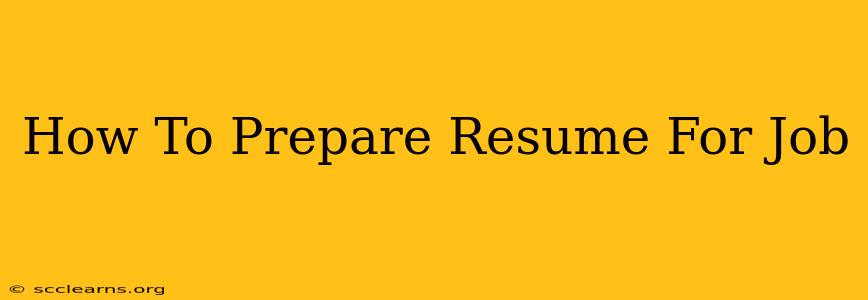Landing your dream job starts with a killer resume. This isn't just about listing your work history; it's about crafting a compelling narrative that showcases your skills and experience in a way that grabs recruiters' attention. This guide will walk you through the process of preparing a resume that stands out from the competition.
Understanding Your Target Audience
Before you even open a word processor, consider who you're writing for. Different jobs require different approaches. Are you applying for an entry-level position, a senior role, or something in between? Research the company and the specific job description to understand what skills and experience they value most. Tailor your resume to match those requirements.
Keywords are Key
Analyze the job description meticulously. Identify keywords and phrases that frequently appear – these are the terms recruiters use in their Applicant Tracking Systems (ATS). Incorporate these keywords naturally throughout your resume, ensuring your skills and experience align with their needs.
Crafting Your Resume: The Essential Sections
A strong resume typically includes these key sections:
1. Contact Information: Keep it Concise and Professional
- Full Name: Use a professional and easy-to-read font size.
- Phone Number: Provide a reliable number where you can be easily reached.
- Email Address: Use a professional-sounding email address.
- LinkedIn Profile URL (Optional): Include this if your profile is up-to-date and professional.
- Location: City and State are usually sufficient; avoid including your full address for privacy reasons.
2. Summary/Objective (Optional, but Highly Recommended): Make a Strong First Impression
A well-written summary or objective statement immediately grabs the reader's attention.
- Summary: Use this if you have significant work experience. Briefly highlight your key accomplishments and skills relevant to the target job.
- Objective: Use this if you're an entry-level candidate or changing careers. State your career goals and how your skills can benefit the employer.
3. Skills: Show, Don't Just Tell
List both hard skills (technical abilities) and soft skills (interpersonal abilities). Use keywords from the job description and quantify your achievements whenever possible. For example, instead of "Proficient in Microsoft Office," write "Proficient in Microsoft Office Suite, including advanced Excel functions used to automate data analysis, resulting in a 15% increase in efficiency."
4. Experience: Showcase Your Accomplishments
This is where you demonstrate your value. Use the STAR method (Situation, Task, Action, Result) to describe your responsibilities and achievements in previous roles. Focus on quantifiable results whenever possible. Use action verbs to begin each bullet point.
5. Education: Highlight Relevant Degrees and Certifications
List your degrees, certifications, and relevant coursework. Include your GPA if it's above 3.5. If you have relevant projects or coursework, briefly mention them.
6. Awards and Recognition (Optional): Boost Your Credibility
Include any awards, honors, or recognitions you've received that are relevant to the job.
Resume Formatting: Presentation Matters
- Choose a Clean and Professional Template: Avoid overly flashy or distracting designs.
- Use a Readable Font: Times New Roman, Arial, or Calibri are good choices.
- Maintain Consistent Formatting: Use consistent font sizes, spacing, and bullet points.
- Proofread Carefully: Errors can cost you the job. Have someone else proofread your resume before submitting it.
- Keep it Concise: Aim for one page, especially if you're early in your career.
Beyond the Resume: The Power of Networking
While a strong resume is crucial, it's only one piece of the puzzle. Network with people in your field, attend industry events, and utilize online platforms like LinkedIn to connect with potential employers and learn about new opportunities.
Conclusion: Your Resume is Your Marketing Tool
Your resume is your personal marketing document. Treat it as such. Invest time and effort in crafting a compelling and effective resume that showcases your unique skills and experience. By following these steps, you'll significantly increase your chances of landing your dream job.

